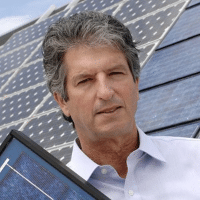Australian solar researcher Professor Martin Green has won the 2018 Global Energy Prize for ground-breaking work in the field of solar energy.
The prestigious Russian award honours major achievements in energy research and technology. The University of New South Wales (UNSW) academic beat contender Elon Musk to win.
Green shares the 2018 prize with Russian thermal power researcher Sergey Alekseenko. A committee of peers selected them from contenders across 14 countries.
Australian solar researcher: The Father of Photovoltaics
The Australian researcher earned the title ‘Father of Photovoltaics’. According to judges, he helped position solar power as the lowest cost option for bulk electricity supply.
Because the cost of solar panels for homes is falling quickly, more residents are also installing home battery storage systems like the Tesla Powerwall.
Green is Director of the Australian Centre for Advanced Photovoltaics at UNSW. The engineering PV research group he founded there is highly regarded internationally.
According to the ABC, his students have also boosted research and reduced solar PV costs by establishing manufacturing centres in Asia.
Green is a world leader in monocrystalline and polycrystalline silicon solar cells. In 1989 his team supplied solar cells for the world’s first PV system. This achieved energy conversion efficiency of 20 per cent.
In 2014 his team doubled this solar conversion efficiency to 40 per cent. Green invented the Passivated Emitter Rear Contact (PERC) solar cell,which is now mainstream technology.
PERC solar cells totalled more than 24 per cent of the world’s silicon cell manufacturing capacity at the end of 2017.
Sales of PERC-based solar energy systems exceeded $US10 billion in 2017. Sales should subsequently exceed $US1 trillion by 2040.
The future of solar energy and battery storage in Australia
Green’s work to date includes study into perovskites as well as selective emitter technology.
Now he is also leading research into semiconductor material for silicon-tandem cells. This could subsequently achieve efficiencies of more than 30 per cent.
In December 2017, UNSW received funding for further research. The ARENA grant will assist research into aspects of silicon solar.
UNSW and the Australia National University will together also research leading causes of power loss across the silicon PV production chain.












































